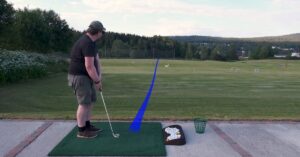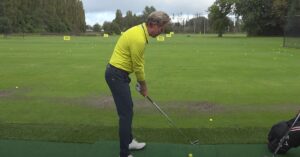How To Become An Amateur Golfer? [From Novice to Natural]
Golf is a captivating game that requires skill and strategy. Anyone can start playing, regardless of age. But how do you go from a beginner to an amateur golfer?
Becoming an amateur golfer involves learning the game, getting equipment, taking lessons, and participating in tournaments. It requires practice, patience, and passion.
This guide covers amateur golf extensively. We’ll discuss what it means to be an amateur golfer, the steps to becoming one, the value of lessons, participating in tournaments, and managing pressure. Get ready to tee off!
![How To Become An Amateur Golfer? [From Novice to Natural] 1 How To Become An Amateur Golfer](https://giftedgolfers.com/wp-content/uploads/2023/05/image-96-1024x575.png)
What Is An Amateur Golfer?
An amateur golfer is a golfer who participates in the sport for recreational purposes or personal enjoyment rather than as a professional occupation.
Amateur golfers typically play golf as a hobby, often in their free time, and may compete in local, regional, or national amateur tournaments.
Amateur golfers do not receive monetary compensation or financial rewards for their performance in golf competitions.
They may have other careers or occupations outside of golf and play the sport purely for the love of the game.
Amateur golfers usually pay their own expenses for equipment, training, and travel to tournaments.
There are various levels of amateur golf, ranging from beginners to highly skilled players.
Some amateur golfers may have a handicap, which is a numerical measure of a player’s ability and is used to level the playing field in competitions.
Handicap systems allow golfers of different skill levels to compete against each other on a more equal basis.
Amateur golfers have the opportunity to turn professional if they choose to pursue a career in golf and meet the necessary qualifications and requirements.
However, once a golfer turns professional and starts accepting prize money, they are no longer considered an amateur.
What Is A Low Amateur In Golf?
In the context of golf, the term “low amateur” refers to the amateur golfer who achieves the lowest score in a golf tournament or championship.
In many professional golf tournaments, there is a separate competition within the event for amateur golfers.
The low amateur is determined by comparing the scores of all the amateur participants, and the individual with the lowest score is awarded the title of a low amateur.
Typically, low amateurs are recognized in major tournaments such as the U.S. Open, the Masters Tournament, the British Open, and the PGA Championship.
These events often invite top amateur golfers to compete alongside professional players, providing them with valuable experience and exposure to high-level competition.
The low amateur achievement is considered a significant honor and is often a testament to the skill and talent of the amateur golfer.
What Are The Basic Steps To Become An Amateur Golfer?
![How To Become An Amateur Golfer? [From Novice to Natural] 2 image 97](https://giftedgolfers.com/wp-content/uploads/2023/05/image-97-1024x573.png)
Becoming an amateur golfer involves developing your skills, gaining experience, and getting involved in the golfing community.
Here are the basic steps to becoming an amateur golfer:
Step 1: Learn the Fundamentals
Start by learning the basics of golf, including grip, stance, posture, and full swing.
Seek guidance from a golf instructor or take lessons to establish a solid foundation.
Step 2: Practice Regularly
Dedicate time to practicing your golf skills consistently. Focus on different aspects of the game, such as driving, iron shots, chipping, and putting.
Practice at the driving range, practice greens, and on-course situations.
Step 3: Understand the Rules and Etiquette
Familiarize yourself with the rules of golf as outlined by the governing bodies, such as the United States Golf Association (USGA) or the Royal and Ancient Golf Club of St Andrews (R&A).
Learn the basic rules, scoring, and golf etiquette to ensure a respectful and enjoyable experience on the course.
Step 4: Obtain a Handicap
A handicap is a measure of your playing ability and allows for fair competition.
Join a recognized golf association or club to establish an official handicap. Submit your scores from qualifying rounds to maintain an accurate handicap index.
Step 5: Play with Others
Engage with other golfers and seek opportunities to play rounds with different skill levels.
Participate in casual games or join golf leagues to experience a variety of playing styles and course conditions.
Step 6: Gain Experience in Tournaments
Start participating in local amateur tournaments to gain competition experience.
Look for events organized by golf associations, clubs, or organizations in your area.
These tournaments provide an opportunity to challenge yourself, measure your progress, and meet other golfers.
Step 7: Continue Learning and Improving
Golf is a lifelong learning process. Stay engaged in your golf education by reading books, watching instructional videos, attending clinics, or working with a golf instructor.
Continuously strive to improve your skills and expand your knowledge of the game.
Step 8: Establish a Network
Connect with other golfers, both experienced and fellow amateurs, to build a network within the golfing community.
Engage in conversations, join online forums, or participate in golf-related social events to learn from others, share experiences, and find golfing buddies.
What Equipment Do I Need To Start Playing Golf As An Amateur?
![How To Become An Amateur Golfer? [From Novice to Natural] 3 image 98](https://giftedgolfers.com/wp-content/uploads/2023/05/image-98-1024x617.png)
Photo Credit- Peter Finch Golf
As an amateur golfer, it’s important to have the right equipment to start playing the game.
Golf Clubs
You’ll need a basic set of golf clubs that includes various types of clubs, such as a driver, irons, and a putter.
Each club serves a specific purpose and is used for different shots on the course.
Golf Balls and Tees
Golf balls are vital for playing the game. They are specially designed for distance, control, and performance.
Tees are small pegs that hold the ball above the ground when teeing off.
Golf Bag
A golf bag is necessary to carry your clubs, golf balls, tees, and other accessories.
It provides organization and protection for your equipment, making it easier to carry them around the course.
How Important Is It To Take Golf Lessons When Starting As An Amateur Golfer?
When starting as an amateur golfer, taking golf lessons can have significant benefits for your game.
Learn Proper Technique
By working with a golf coach, you can learn the correct swing mechanics right from the beginning.
This helps you establish a solid foundation and develop good habits in your game.
Avoid Bad Habits
Professional instruction helps you avoid developing bad habits that can hinder your progress.
A coach can identify any flaws in your technique and provide guidance to correct them, ensuring you develop sound fundamentals.
Accelerate Your Progress
Taking golf lessons often leads to faster improvement compared to self-learning.
With the guidance of a coach, you can focus on specific areas of your game that need improvement, receive tailored feedback, and make progress more efficiently.
How Can I Participate In Amateur Golf Tournaments And Events?
Participating in amateur golf tournaments and events is an excellent way to challenge yourself, measure your progress, and experience competitive golf. Here are some steps to help you get involved:
Research Local Tournaments
Explore golf associations, clubs, and organizations in your area that host amateur tournaments.
Check their websites, social media platforms, or contact them directly to find out about upcoming events.
Review Tournament Eligibility
Understand the eligibility criteria for each tournament. Some tournaments may have specific age restrictions, handicap requirements, or membership prerequisites.
Ensure that you meet the criteria before registering.
Obtain a Handicap
If the tournament requires a handicap, obtain one through a certified golf association or club. A handicap is a measure of your playing ability and ensures fair competition.
Register Early
Once you identify tournaments of interest, register as early as possible. Amateur tournaments often have limited spots and may fill up quickly.
Pay attention to registration deadlines and ensure you complete the registration process within the specified timeframe.
Prepare Mentally and Physically
Prior to the tournament, focus on your mental and physical preparation. Practice your golf skills, work on specific areas of improvement, and play practice rounds at the tournament venue if possible.
Mentally visualize yourself performing well and develop strategies for managing nerves and pressure.
Familiarize Yourself with the Rules
Review the rules and regulations of the tournament. Understand the format, scoring system, tee times, and any specific rules unique to the event.
Familiarize yourself with the local rules and etiquette expected on the course.
Arrive Early
On the tournament day, arrive early to the venue. This allows time for warm-up, checking in, and getting familiar with the course conditions. Give yourself ample time to settle in and mentally prepare for the round.
Play with Integrity
During the tournament, prioritize integrity and respect for the rules of golf. Play by the rules, keep an accurate scorecard, and demonstrate good sportsmanship towards fellow competitors.
Learn from the Experience
Regardless of the tournament outcome, view each event as a learning opportunity. Reflect on your performance, identify areas for improvement, and use the experience to further develop your skills.
Tips For Managing Nerves And Pressure While Playing As An Amateur Golfer
Managing nerves and pressure while playing golf as an amateur can greatly enhance your performance and enjoyment on the course. Here are some tips to help you handle nerves and pressure effectively:
Deep Breathing and Relaxation Techniques
Practice deep breathing exercises and relaxation techniques to calm your mind and body.
Take slow, deep breaths before each shot to release tension and promote a state of relaxation.
Focus on the Process, Not the Outcome
Instead of fixating on the score or the result of each shot, shift your focus to the process and execution.
Concentrate on your pre-shot routine, target visualization, and make a smooth swing. Trust that by executing each shot to the best of your ability, the results will follow.
Positive Self-Talk
Use positive affirmations and self-talk to boost your confidence and manage your nerves.
Replace negative thoughts with positive statements, such as “I am capable of hitting a great shot” or “I trust my skills and preparation.”
Visualization
Visualize successful shots and positive outcomes before hitting each shot. Imagine the trajectory, landing spot, and the feeling of executing a perfect shot. This mental imagery can help reduce anxiety and increase confidence.
Stay Present and Mindful
Avoid dwelling on past mistakes or worrying about future shots. Stay present in the current moment and focus on one shot at a time.
Mindfulness techniques, such as observing your surroundings or focusing on your senses, can help anchor you to the present moment.
Develop a Pre-Shot Routine
Establish a consistent pre-shot routine that includes visualizing the shot, aligning your body, and taking practice swings.
Following a routine creates a sense of familiarity and helps to channel your focus and energy in a constructive manner.
Play Practice Rounds
Familiarize yourself with the course by playing practice rounds before important events or tournaments.
This will help reduce surprises and build confidence in your ability to navigate the course effectively.
Embrace the Challenge
Embrace the pressure and nerves as a natural part of the game. Rather than viewing them as obstacles, see them as opportunities to perform at your best and showcase your skills.
FAQs
Let’s address some common queries that aspiring amateur golfers often have.
At What Age Can You Become A Professional Golfer?
There’s no specific age, but it requires years of practice and a high skill level to turn professional.
How Many Years Does It Take To Be A Good Golfer?
It can vary widely, but consistent practice over several years is typically needed to become proficient.
How Important Are Mental Preparation And Focus In Amateur Golf?
Mental preparation and focus are essential in golf, affecting decision-making and stress management during play.
Can I become an amateur golfer if I start playing golf in my 40s?
Absolutely! Age is not a barrier in golf. With consistent practice and dedication, anyone can become an amateur golfer.
How often should an amateur golfer practice?
While the frequency of practice can vary based on personal circumstances, it is generally recommended for amateur golfers to practice several times a week to enhance their skills and improve their overall game.
Final Words
Embarking on the journey to become an amateur golfer can be both challenging and rewarding.
It’s a path filled with learning, growth, and the joy of playing a game that brings people together.
So, stay patient, practice regularly, and remember to enjoy every moment on the course. Happy golfing!






